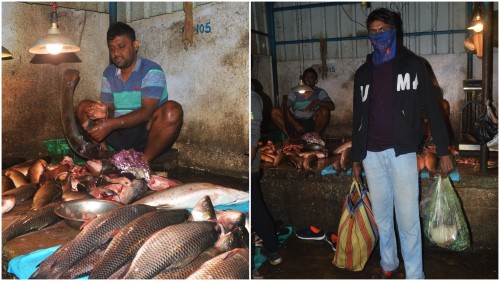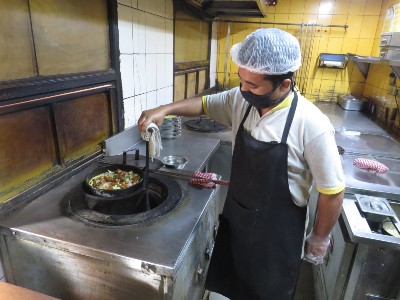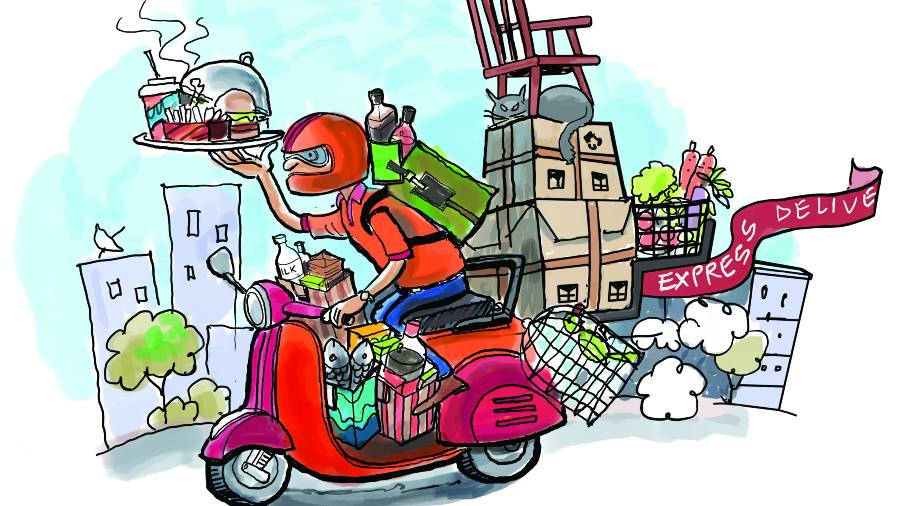Bored homemakers, out-of-work youths, crafty businessmen…. Many a resident has hopped on to the home delivery bandwagon during the pandemic. Some are making dal-bhat for senior citizens, others biriyani and pizza, or even delivering vegetables.
In a world where leaving home has become a risk, these businesses are helping many trudge along while providing the owners a source of income in this uncertain economy.
Business out of boredom
Four homemakers had been mulling starting a business for years now but finally took the plunge this fateful year. “Our sons were in either the same school or coaching centres. We moms would drop them off at chemistry tuition in CA Block and catch up at CA Park or City Centre,” says Debarati Biswas, one of the four.
When their sons graduated during the pandemic, the moms suddenly realised they had a lot of time to kill. “We started looking for options and took a franchise of Pithe Bilashi in Lake Town near the Big Ben clock tower,” she says.
Well, that’s where the outlet is, but the meals are all getting home-delivered. “No one would be willing to sit at a restaurant while Covid is in the air and so it worked out fine for us,” says Debarati, busy packing off Chingri Malaicurry Patishapta and Mutton Polanno. “We are getting picnic orders too.”
One not-so-fine July morning, Kalpana Mukherjee of DLF New Town Heights announced to her husband that she was starting a home delivery. “Months of doing nothing but jhadu-pocha-bartan was spreading negativity,” says the lady who has worked in the hospitality industry across the world. “I find cooking to be a stress buster and that’s what I wanted to do. My grandkids call me Ammu and so we named the venture Ammu’s Kitchen.”
Kalpana started by advertising her dishes on the ladies’ WhatsApp group in the complex and now gets three or four orders every day for her parathas, Chicken Korma or Kashmiri Dum Alu. One customer orders all his meals from her.
Then there is Rahul Arora, chef and owner of popular restaurants like Bon Appetit and Paranthe Wali Galli across the city, including at Salt Lake’s AD Block, where he lives. “Mine are budget restaurants that caters primarily to school and college students. With these institutions shut it’s not feasible to run them but I was going insane without being able to cook for customers,” says Rahul.
But when friends started requesting him for some fancy dishes, claiming only dal-bhat outlets were delivering during the lockdown, he decided to do something about it. “I now cook cuisines you won’t get anywhere in the city — Turkish, Balinese, Javanese, Konkani — but only on Sundays. People pick it up or get it delivered and I have an upper limit of 10 orders as the meals are complex and I’m a one-man army now.”
Survival strategy
Bobby Halder took to delivering eggs after she lost her business in the lockdown. “I used to run a cloud kitchen and prepare meals for students and the elderly but all students left their hostels and PG accommodations and went home, leaving me high and dry,” she says. Bobby now sells eggs in Bangur Avenue and delivers to customers nearby “It was a survival strategy.”.
When Santanu Dey realised footfall was dwindling in the lockdown, the fish vendor from Muchibazar near Ultadanga started an online fish, fruit and vegetable delivery system and launched an app called Barite Bazar. They have a physical store near the Bengal Chemical Metro stop too.
“The fish is cut to pieces and cleaned at Muchibazar. It is then packed and supplied to households across Salt Lake, Lake Town, Kestopur, Kankurgachhi and Phoolbagan. Not all are old customers; there are many new ones who started ordering during the lockdown and became loyalists. The market has increased by more than 20 per cent,” said Dey.
Waiting in the wings
For some, cloud kitchens were in the pipeline for months or even years. “We have been planning Shahi Khansama for a year and a half and would have launched around Poila Baisakh but for the pandemic,” says Biswadeep Chakraborty, who along with partner Atanu Pal, has started the cloud kitchen in EC Block.
“Restaurants were mushrooming till last year but our research says that 80 per cent of them downed shutters within two years due to overheads. Rent alone, in a decent location, costs up to a lakh a month. We are planning seven or eight branches of this restaurant across Bengal and most of them would be in the cloud kitchen format,” he says.
Eventually Biswadeep launched the venture in time for the Pujas.
Kloud Kitchen, another venture in EC Block, was to open in March but got postponed to June. “We have a chain of restaurants across the country but this is our first one in cloud format.
“A chunk of our customers comprises corporate clients such as banks and they were initially scared to order food from outside. Now they are ordering in bulk and we are sending out at least 50 orders a day,” says Uday Rawal. They serve Chinese, Indian and tandoori food.
Government bodies aren’t left behind either.
The West Bengal Comprehensive Area Development Corporation (WBCADC), a wing of the panchayats and rural development department, has set up a kitchen at Mrittika Bhavan, DD Block, near Rabindra Okakura Bhavan, where a canteen run by self-help group women serves food.
The home delivery initiative took off during the lockdown. “We had bought six vehicles in February to roam the lanes of Salt Lake with our groceries, fish, meat and vegetables. In March, we extended the service to New Town but when the lockdown started, our minister (Subrata Mukherjee) wanted us to help the entire city. So we started taking home delivery orders from all over,” says Soumyajit Das, administrative secretary, WBCADC.
“The pandemic is giving equal opportunity to all. People are not stepping out of home to go to big restaurants so the fight between big capital and small capital is being fought on a level playing field as it is all down to home delivery now. This is an opportunity for self-help groups,” he adds.
The management of Rang De Basanti Dhaba has launched a cloud kitchen under a separate brandname, Curry & Crust, from a floor above its Sector V restaurant for home delivery of Indianised pizzas (Turn to Page 7 for more).
Recalling the trying months of the lockdown, Abhimanyu Maheshwari, founder and CEO, Zing Restaurants, says: “Sales went down to zero at the restaurant but home delivery never stopped. Even before the pandemic, 50 per cent of our sales came from home or office delivery. We wanted to expand our offerings in this segment.”
In a post-pandemic world, he points out, credibility of a brand will play a big role. “Customers are looking for hygiene and safety standards,” he says.

A fishmonger at Muchibazar cuts fish that is picked up by an entrepreneur who has started a home delivery business. Debasmita Bhattacharjee
Waiting in the wings
For some, cloud kitchens were in the pipeline for months or even years. “We have been planning Shahi Khansama for a year and a half and would have launched around Poila Baisakh but for the pandemic,” says Biswadeep Chakraborty, who along with partner Atanu Pal, has started the cloud kitchen in EC Block.
“Restaurants were mushrooming till last year but our research says that 80 per cent of them downed shutters within two years due to overheads. Rent alone, in a decent location, costs up to a lakh a month. We are planning seven or eight branches of this restaurant across Bengal and most of them would be in the cloud kitchen format,” he says.
Eventually Biswadeep launched the venture in time for the Pujas.
Kloud Kitchen, another venture in EC Block, was to open in March but got postponed to June. “We have a chain of restaurants across the country but this is our first one in cloud format.
“A chunk of our customers comprises corporate clients such as banks and they were initially scared to order food from outside. Now they are ordering in bulk and we are sending out at least 50 orders a day,” says Uday Rawal. They serve Chinese, Indian and tandoori food.
Government bodies aren’t left behind either.
The West Bengal Comprehensive Area Development Corporation (WBCADC), a wing of the panchayats and rural development department, has set up a kitchen at Mrittika Bhavan, DD Block, near Rabindra Okakura Bhavan, where a canteen run by self-help group women serves food.
The home delivery initiative took off during the lockdown. “We had bought six vehicles in February to roam the lanes of Salt Lake with our groceries, fish, meat and vegetables. In March, we extended the service to New Town but when the lockdown started, our minister (Subrata Mukherjee) wanted us to help the entire city. So we started taking home delivery orders from all over,” says Soumyajit Das, administrative secretary, WBCADC.
“The pandemic is giving equal opportunity to all. People are not stepping out of home to go to big restaurants so the fight between big capital and small capital is being fought on a level playing field as it is all down to home delivery now. This is an opportunity for self-help groups,” he adds.
The management of Rang De Basanti Dhaba has launched a cloud kitchen under a separate brandname, Curry & Crust, from a floor above its Sector V restaurant for home delivery of Indianised pizzas (Turn to Page 7 for more).
Recalling the trying months of the lockdown, Abhimanyu Maheshwari, founder and CEO, Zing Restaurants, says: “Sales went down to zero at the restaurant but home delivery never stopped. Even before the pandemic, 50 per cent of our sales came from home or office delivery. We wanted to expand our offerings in this segment.”
In a post-pandemic world, he points out, credibility of a brand will play a big role. “Customers are looking for hygiene and safety standards,” he says.

A pizza being taken out of the tandoor in the cloud kitchen of Curry & Crust in Sector V. Sudeshna Banerjee
For the greater good
GC Block Community Kitchen was started in May when residents, particularly senior citizens, were pleading for help. “On one hand, they suffered without cooks and on the other cooks went without jobs,” says the block’s executive committee, member Jhumpa Ghosh.
“So we worked out an arrangement where a cook who lives in a garage of the block was allowed to prepare meals at the community hall. Her family helped her pack and deliver the food to residents who ordered,” says Ghosh. They now cater to nearby blocks on a regular basis and when the cook — Malina Mondal — makes biryani, orders pour in from as far as AJ Block at the other end of the township.
Even after domestic helps returned to work, some residents continue with the service as it is fuss-free and eliminates the need to go shop.
Indrajit Bhattacharya, a CL Block resident, had been planning a vegetable delivery business. “But the lockdown forced us to start the project prematurely, when we saw the plight of elderly. They were afraid to go to the markets and also unable to access the digital platforms of grocery apps,” he says.
“My father is a food technologist and through our primary business of processing and export of seafood, we were already tied up with farmers across Bengal and Odisha,” Indrajit continues. So in April, they began Bengal Fresh Farms from which customers could order over phone and WhatsApp. Their website launches after Christmas and they are adding meat, fish, poultry etc to their list. “We are aiming for 1,000 customers per day by the end of this financial year.”
Debdeep Kar is a philanthropist who supports animals and needy children. About a month back, he and a partner started a home delivery unit called Hungry Genie next to AE Market. “A chunk of the profits is going to charity,” he says.
They are now serving Italian, Russian and Mexican food. “We have space for a few diners to sit and eat but most people prefer to eat at home now,” Debdeep says.
Covid challenges
Those like Kalpana are facing manpower shortage. “The first thing I needed for this business was containers to pack the food but nothing suitable was available online. My husband is unwell, mother is 85 and so I’m not leaving the house,” says the lady who finally found a delivery boy to transport her food as well as fetch her ingredients and containers.
But Kalpana did not even have a domestic help till December, let alone someone to help out with orders. “My family forced me to get one and I agreed as I didn’t want to be fiddling with water during winter. The help now does my housekeeping as well as washing and chopping for my orders. But I am not taking anyone else so I cannot expand till the pandemic is over,” she says.
Shahi Khansama is investing heavily in technology. “We shall use augmented reality to interact with customers. Anyone pointing his phone at our logo may see, for instance, a video of how his biriyani was made,” smiles Biswadeep. But the Gurgaon-based company building this technology had a setback due to the pandemic and work was stalled.
Biswadeep has now signed up another company. “We were to fly to Iran to buy spices too but now that won’t be possible; we had wanted to take up stalls in Bidhannagar Mela and all the other fairs this winter but now there’s no telling if the fairs will take place at all.”
Happy hearts
Despite the challenges, the entrepreneurs are satisfied. “We are learning something new everyday,” smiles Debarati of Pithe Bilashi. “If one of us is unable to come to the centre now we feel restless.”
Kalpana had shifted from Jal Vayu Towers to New Town Heights shortly before the lockdown so she hadn’t even had time to make new friends. “Now even if neighbours are coming to pick up the grub with masks on, at least I get to see and speak to them. Besides, I’m feeling happy and creative now,” says the lady who has also applied for a certification from the Food Safety and Standards Authority of India (FSSAI). “I might be the only home delivery joint to seek this but given my background in the hotel industry, I want to play by the book.”
The experience has been liberating for Rahul too. “At one point of being a chef, you’re no longer cooking, just seasoning. Your juniors are doing the actual cooking. And if you run a popular restaurant you have to cook what sells. I made a Khow Suey after 10 years as my regular customers do not want this. But now I’m building a personal rapport with customers. A piece of me is going out with my meals,” he says.
Rahul has, in fact, come to love it so much that even after his restaurants reopen he wants to hold Sunday meals on his terrace for a limited number of diners. “Home delivery may be convenient but the customer’s only interaction is with a box with a logo. Where’s the element of warmth? Being served by someone in a mask feels like someone’s out to draw your blood! That’s not how old school hospitality works,” he says.
Additional reporting by Showli Chakraborty and Sudeshna Banerjee










